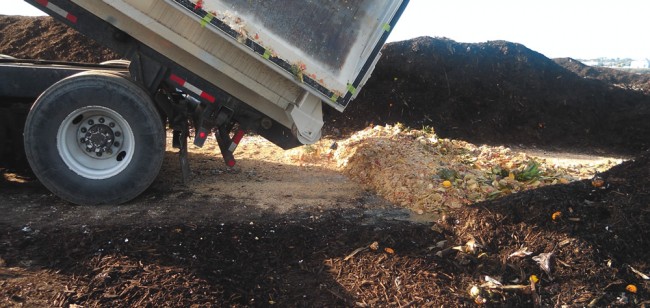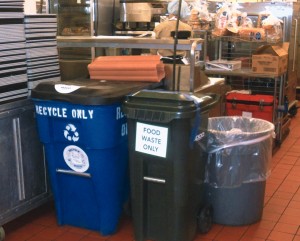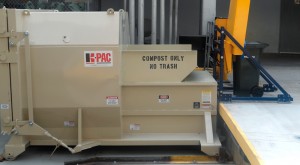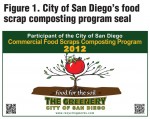Since March 2012, two Sharp Health Care facilities in San Diego have been sending an average of 3.5 tons/week of clean food waste to the city’s composting facility.
Ana Carvalho
BioCycle December 2012, Vol. 53, No. 12, p. 22
The City of San Diego, California offers a commercial food scraps composting program. Food waste is collected from commercial generators by the city’s franchised haulers, and composted at the Miramar Greenery, the city’s composting facility. To expand the diversion program to large generators, city staff presented the program to a working group of local hospitals at the group’s quarterly meeting in April 2010. In March 2012, one of the biggest hospital chains in San Diego, Sharp Health Care, joined the program, bringing on two of its three hospitals in the city: Sharp Memorial Hospital, a 315,000-square-foot facility with 417 maintained beds, and Mary Birch Hospital for Women & Newborns, which has 212 maintained beds, and delivers more than 8,600 babies each year (the most in California).
The two hospitals share one central kitchen managed by Sodexo, which serves over 629 beds plus two cafeterias for staff and visitors. The initial step was to estimate food waste generation, including preconsumer, e.g., kitchen prep and spoilage, and postconsumer scraps captured by kitchen staff from patient rooms and cafeteria trays (cafeteria workers scrape the plates). To avoid the cost of a waste characterization study for the hospital, the evaluation was done by counting the number and size of trash bags generated in the kitchen per day. Food waste was determined to be about 80 percent of the weight — approximately 7,000 lbs — since there were still recyclables in the trash bags. Based on that approximation, an estimate was calculated for weekly food waste generation and appropriate service level for the hospital.
The second step was to bring the hospital into full compliance with San Diego’s mandatory recycling ordinance. As part of the city’s requirements for participation in the food scraps composting program, all participants must comply fully with the ordinance, meaning recycling all paper, cardboard, metal, plastic and glass containers, and rigid plastics. The hospital, although already doing a good job with its commodities recycling program, had to ramp up the convenience of the recycling containers and proper signage throughout the hospitals. This process took some time as new containers had to be purchased and signs created.
Technical Assistance, Program Results
City staff made several technical assistance visits to the hospitals, addressing new questions and logistics, verifying and revising calculations, helping with creation of proper signage and educating hospital managers and staff about the program. The city also worked with the hospitals and the hauler on service levels. A tour of the Miramar Greenery was organized for hospital managers and key staff. Once everything was set, the city conducted several training sessions for all kitchen and janitorial staff involved with the program, and all supervisors.
The city also had a booth at the hospitals’ Earth Day celebration to provide information about recycling and composting; samples of the Greenery’s compost were distributed to their employees. This was very effective in bringing awareness about the importance of recycling and composting and the Greenery’s compost product, starting the “buzz” about the upcoming food scraps composting program, and overcoming the “yuck” factor.
On March 28, 2012, Sharp’s first load was delivered to the Greenery by its hauler, EDCO Waste and Recycling Services. As part of the program requirements, Sharp staff had to accompany and inspect the first three loads with city staff to ensure that any contamination issue could be identified and properly addressed back at the hospitals. Since then, Sharp has been bringing an average of 3.5 tons of clean food waste every week to be composted at the Greenery, translating to approximately 11 lbs/bed/week. In the first five months since starting the program (April to September 2012), the hospitals have been able to decrease their trash services from four times a week to three times a week, and saved approximately $3,400 in tipping fees and waste hauling costs.
Sharp Memorial Hospital and Mary Birch Hospital for Women & Newborns have been awarded with the City of San Diego’s food scraps composting program seal (Figure 1), recognized in the San Diego Business Journal, and presented their successful experience to the other hospitals in the region. Sharp and city staff are working to implement the program at their four other hospitals in the San Diego area.
Ana Carvalho is an Environmental Specialist with the City of San Diego (CA) Environmental Services Department.














